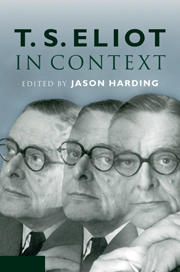Book contents
- Frontmatter
- Contents
- List of illustrations
- List of contributors
- Acknowledgements
- List of abbreviations
- Introduction
- PART ONE LIFE
- PART TWO FORMS
- PART THREE LITERARY CROSS-CURRENTS
- PART FOUR POLITICS, SOCIETY AND CULTURE
- 26 Politics
- 27 Economics
- 28 Anti-Semitism
- 29 Gender
- 30 Religion
- 31 Philosophy
- 32 Social science
- 33 Natural science
- PART FIVE RECEPTION
- Further reading
- Index
28 - Anti-Semitism
Published online by Cambridge University Press: 05 August 2012
- Frontmatter
- Contents
- List of illustrations
- List of contributors
- Acknowledgements
- List of abbreviations
- Introduction
- PART ONE LIFE
- PART TWO FORMS
- PART THREE LITERARY CROSS-CURRENTS
- PART FOUR POLITICS, SOCIETY AND CULTURE
- 26 Politics
- 27 Economics
- 28 Anti-Semitism
- 29 Gender
- 30 Religion
- 31 Philosophy
- 32 Social science
- 33 Natural science
- PART FIVE RECEPTION
- Further reading
- Index
Summary
Today when people are asked what they know about T. S. Eliot, most mention three things: he was the librettist of the enormously popular Andrew Lloyd Webber musical Cats; he wrote one of the most celebrated and difficult poems of the twentieth century, The Waste Land; and he was an anti-Semite. This last tag, fastened to him after the end of the Second World War, has been the focus ever since of a sometimes acrimonious debate among critics, scholars, and, occasionally, in the popular press. Although Eliot's offending works were written before the Second World War, it wasn't until after the war that anyone thought the anti-Semitism was significant enough to make it the topic of public argument. It seems that before the war, the incidental anti-Semitism of many Europeans and Americans camouflaged attitudes that after the war took on a more sinister and menacing colouring. Two things contributed to the appearance and persistence of the charge against Eliot: firstly, the new position of Jewry in the public sphere after the Holocaust and, secondly, Eliot's own fame and celebrity as a poet and cultural spokesman. After his Nobel prize in 1948, he was a leading public intellectual in the English-speaking world. It did not help that he spoke for a conservatism that some people mistook for the virulent, right-wing authoritarianism of Fascist Germany, Italy and Spain. Although his visibility as a public figure brought greater attention to his work, it also made him a target.
Information
- Type
- Chapter
- Information
- T. S. Eliot in Context , pp. 285 - 294Publisher: Cambridge University PressPrint publication year: 2011
